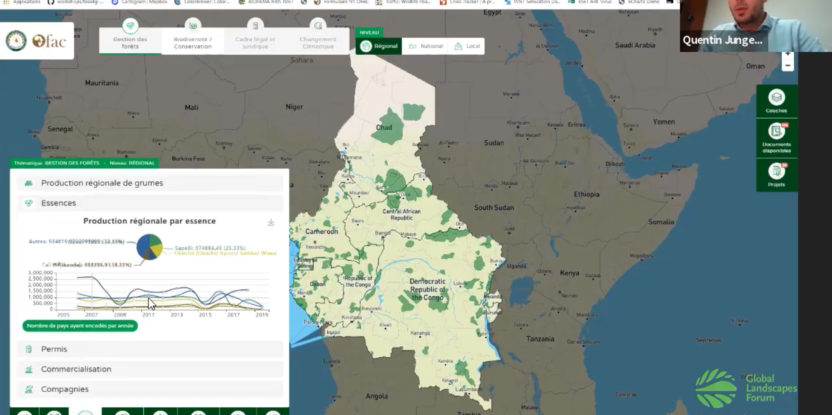
Central Africa is home to the Congo Basin, the largest tropical forest on the African continent, a major carbon sink.
It is an important biodiversity hotspot that covers over 200 million hectares, spreads across six countries, and supports the livelihoods of about 60 million people dependent upon it for food, energy and jobs. Critically endangered animals such as lowland gorillas, and more than 10,000 endemic tropical plant species depend on its lush ecosystems for their survival.
Despite the Congo Basin’s central role in the regional economy, obtaining regional-level data can be difficult for governments, donors and implementing partners, seeking to make informed decisions on the conservation and sustainable use of ecosystems.
The Observatory of Central African Forests (OFAC), which was created over a decade ago to address that challenge, has now launched an analysis portal that keeps track of policies and trends to examine their impact on forest ecosystems at the regional, national and local levels. The objective of the digital platform is to provide a single-entry point through which researchers and decision-makers can access information on the subject and follow emerging trends.
“We strongly encourage political and technical experts to make the most of the high-quality data available in the platform,” said Raymond Ndomba Ngoye, executive secretary of the intergovernmental organization Central African Forest Commission (COMIFAC), during the launch at the Global Landscapes Forum Biodiversity Digital Conference.
“The new tool is expected to make an important contribution toward regional cooperation and harmonization of sectoral policies among the 10 member states of COMIFAC,” he said.
The data are also important from an economic development perspective, said Honoré Tabuna, Commissioner for the Environment, Natural Resources, Agriculture and Rural Development at the Economic Community Central African States (CEEAC). “Data production is essential for the development of a natural-resource-based economy in Central Africa, especially, around protected areas.”
Mostly funded by the European Union, the portal features key data such as production, certification, export, transformation and trade volumes of timber, as well as conservation policies and the contribution of forests and biodiversity to national economies.
It also provides a wealth of interactive maps, satellite imagery, visualizations and filters to help users navigate and interpret the data, said OFAC technical assistant Quentin Jungers.
“The platform is currently focused on forest management and biodiversity conservation at the regional, national and local level, including protected areas and forest concessions. We are working to incorporate analyses on legal frameworks and climate change, and we shall soon provide data at the landscape level,” Jungers said.
It comprises a database of more than 650 environmental and development initiatives in the region, which are valued at 6 billion euros ($7 billion) and represent 80 donors and 324 implementing agencies. It also includes a multimedia library with 1,200 scientific, technical and policy documents. Most of the data are open source.
IMMEDIATE APPLICATIONS
“The new portal responds to the various needs of users: reviewing management plans; analyzing cross-border issues; defining baselines; evaluating policies and monitoring the efficacy of management strategies,” said OFAC data management analyst Donald Djossi.
Among the target users are researchers who are working on major assessments of the region.
“Our upcoming report ‘State of Protected Areas in Central Africa,’ will greatly benefit from the data and analyses on the new platform,” said coordinator of the OFAC support project (RIOFAC) Florence Palla. The expert underscored the importance of data for the implementation of the post-2020 Biodiversity Framework – a global roadmap for the next decade to be agreed during the U.N. Biodiversity Conference (CBD COP15) in Kunming, China, in 2021.
Senior scientist and hub leader with the Center for International Forestry Research (CIFOR), Richard Eba’a Atyi, agreed on the importance of reliable data, and noted he will also benefit from the new portal for the production of the upcoming report “State of the Forests in Central Africa,” in 2021. The publication will explore such issues as forestry plantations, REDD+ (Reducing Emissions from Deforestation and forest Degradation), zero deforestation commitments and progress towards the Sustainable Development Goals.
Creating and maintaining a data portal on forests is not a simple task, Djossi said. “We must thoroughly follow up with countries to ensure data have been collected in an adequate way and are reliable,” he said, alluding to challenges in accessing some of the data.
For Philippe Mayaux, biodiversity team leader at the European Commission’s Directorate-General for International Cooperation and Development, the effort is well worth it: “Good political and technical decisions require good information and, in the past, we didn’t always have it. The data provided by OFAC is of utmost importance to monitor forestry, climate and biodiversity policies.”
We want you to share Forests News content, which is licensed under Creative Commons Attribution-NonCommercial-ShareAlike 4.0 International (CC BY-NC-SA 4.0). This means you are free to redistribute our material for non-commercial purposes. All we ask is that you give Forests News appropriate credit and link to the original Forests News content, indicate if changes were made, and distribute your contributions under the same Creative Commons license. You must notify Forests News if you repost, reprint or reuse our materials by contacting forestsnews@cifor-icraf.org.